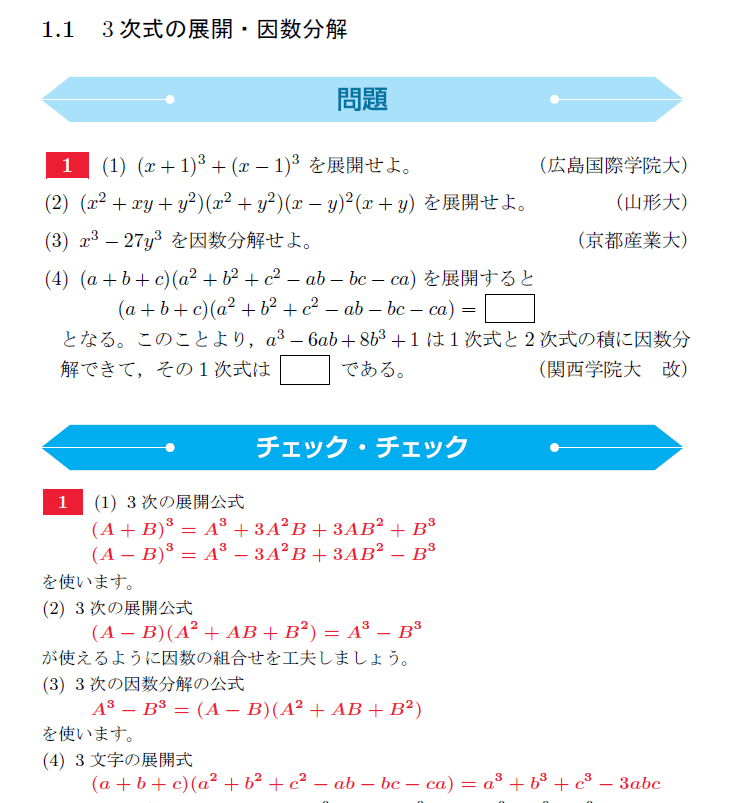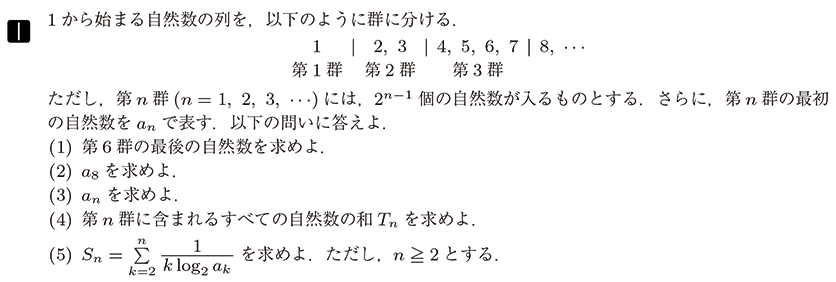

※スカイプ体験授業で解説しています。
※色々なレベルに合わせた十数種類以上の教材をご用意しております。
まずは、浪人が決まったことを悔やまないでください。志望する大学に入るためには、時には長い時間と多大な努力が必要な場合があります。浪人という道を選んだことは、あなたが夢を追いかけるために必要なことであると信じています。
浪人は一つの挑戦です。一年浪人をすることで、自分自身を成長させ、新しいことを学ぶことができます。自分自身の目標を達成するために必要な準備をし、前回の失敗から学び、それを活かすことができます。過去の経験を生かし、今度こそ合格を勝ち取ることができるでしょう。
浪人中は、一人で取り組むことが多いため、孤独を感じることがあるかもしれません。しかし、同じ目標を持つ仲間や、サポートしてくれる家族や友人がいることを思い出してください。彼らはあなたを応援してくれ、あなたが成功するために尽力してくれます。また、時には、自分の思考や学習方法を見直すことも必要です。自分自身に対して厳しくあることも大切ですが、同時に自分自身を労わることも忘れないでください。
最後に、あなたが目標を達成するために必要なのは、諦めない強い意志です。目標が遠く感じられるときも、一歩一歩進んでいくことを忘れず、焦らずに努力を続けてください。浪人は、自分自身を知り、成長する素晴らしい機会です。自分自身を信じ、前に進んでください。
あなたの明るい未来を祈っています。
心から全力で、さくら教育研究所が応援します!

・今から30年後、移動の手段はどうなっていると考えるか、600字以内で論ぜよ。
今後の30年間において、移動手段はさらに進化し、より効率的で持続可能な形態になると予想されます。
第一に、自動運転技術がますます発展していくことが予想されます。自動運転技術によって、車両の運転は完全に自動化され、人為的なミスを防ぎながら、効率的でスムーズな交通を実現することができます。これにより、渋滞や事故の発生率が低下し、道路のキャパシティも増加するため、移動の時間やコストを削減することができます。
第二に、電気自動車の普及が進むことが予想されます。環境にやさしい電気自動車は、化石燃料に依存しないため、CO2排出量を減らすことができます。また、急速な充電技術の進歩により、充電時間が短縮され、走行距離が延長されるため、より便利で使い勝手が良くなると考えられます。
第三に、新しい移動手段が登場する可能性があります。例えば、空飛ぶ車やドローンによる移動が現実的になるかもしれません。これによって、地上の交通渋滞を回避し、高速で移動することができます。しかし、このような技術には、現在の航空法規制や技術的な制約があるため、実現するまでには時間がかかると予想されます。
総じて、移動手段はますます効率的で環境にやさしい形態に進化すると予想されます。自動運転技術や電気自動車の普及など、既存の技術の進化によって、移動のコストや時間を削減することができます。同時に、新しい移動手段の登場によって、より快適で効率的な移動が可能になると期待されます。
・Describe in 600 words or less what you think the means of transportation will be like 30 years from now.
Over the next 30 years, transportation is expected to evolve further, becoming more efficient and sustainable.
First, it is expected that autonomous driving technology will continue to develop. Self-driving technology allows vehicles to operate fully automatically, avoiding human error while ensuring efficient and smooth traffic. This will reduce congestion and accident rates and increase road capacity, thus reducing travel time and costs.
Second, it is expected that electric vehicles will become more popular. Environmentally friendly electric vehicles can reduce CO2 emissions as they do not rely on fossil fuels. In addition, advances in rapid charging technology will shorten charging time and extend driving range, making it more convenient and user-friendly.
Third, new modes of transportation may emerge. For example, flying cars and drones may become a reality. This allows you to avoid ground traffic jams and travel at high speed. However, due to current aviation law regulations and technical constraints, such technology is expected to take some time to materialize.
Overall, transportation is expected to evolve into increasingly efficient and environmentally friendly forms. Advances in existing technologies, such as self-driving technology and the spread of electric vehicles, can reduce travel costs and time. At the same time, the advent of new means of transportation is expected to make transportation more comfortable and efficient.
数学は反復練習で克服する
何か抽象的なものを理解しなくてはいけないとき、脳に必要なのは反復練習だ。代表的なものは、数学。数学が分かりにくい理由の1つは、概念が抽象的であるからだ。実際に目に見える物体であればその概念はつかみやすい。また目に見えないものでも、愛や希望や情熱などは自分の感情と結びついているため、それがどんなものか実感できる。
しかし数学はどうだろうか。+、×、÷、√などは非常に抽象的で、説明されてもピンときにくい。実感として概念を理解しづらいため、もともと脳に定着しにくい。そこで必要なのが、反復練習だ。サッカーやバレエなどと同じで、数学や科学など抽象的なものを理解するには、反復の練習が必要。脳を鍛えると言ってもいいかもしれない。同じ思考パターンを繰り返す内に、徐々に理解ができるようになる。だから数学などは少しずつでも、毎日繰り返し練習することが必要なのだ。
脳内に情報のチャンク(塊)を作る
私たちが何か知らないことを学ぶ時に、新しい情報や概念はバラバラになったジグソーパズルのようになっている。それをまとめて、一つの塊を作ることがチャンキングだ。
例えば、ピアノを弾いたことがない人が初めてピアノを弾く時、この音符の時は鍵盤のドを押す・・・というように、細かい動き1つ1つを考えながら弾いていく。しかし、ピアノが弾ける人は一連の動きが脳内で塊になっているので、細かい動作を考える必要がない。基礎的なことを繰り返すことによって、一連の動きや情報が塊になり、その塊自体にラベルが付けられる。このチャンキングによって、長期記憶の中に情報が整理された状態で保存され、引き出しが増えるので思い出しやすくなる。 タコが足を伸ばすように、1つの入り口から関連した情報を引き出してくることができるのだ。


Exercises 3
1. 各組の文がほぼ同じ意味になるように( )内に適語を入れなさい.
1)It seems that the boy is from England.
The boy ( ) ( ) ( ) from England.
2)It seemed that they knew the news.
They ( ) ( ) ( ) the news.
*3)It appears that she likes playing basketball.
She ( ) ( ) ( ) playing basketball.
*4)It ( ) ( ) ( ) saw a friend of his at the station.
He happened to see a friend of his at the station.
2. 日本語に合うように( )内の語句を並べかえなさい.
1) 彼は今は家にいないようだ.
(at the moment, not, seems, is, it, he, that, at home).
2) トムは新しいグローブを買ったようだ.
(a, it, seems, bought, Tom, glove, that, has, new).
*3) 私には彼女はダイエットに成功したように思われる.
It appears (me, has, her diet, been, successful, to, that).
*4) 私は列車の中でたまたまベンの隣に座った.
(sat, I, it, in the train, that, Ben, next to, happened).
3. “should” の意味
It seems that some Japanese students of English have been taught that “should” has the same meaning as“must,”and thus is a stronger expression than “had better.” In modern American English, however, just the opposite is true, and “should” is considered the softer of the two expressions.
文章9 メディアの持つ力とは? 上智大学
日本における【大衆社会】は、一九二〇年代に萌芽(ほうが)したとされる。都市化が進み、大量生産・大量消費社会が不完全ながらも出現し、様々な大衆文化が花開いた。戦時中から戦後にかけていったん停滞するが、一九六〇年代以降の経済の復興やテレビの浸透などによって、大衆社会の本格的な到来を迎え、現在に至っている。
大衆社会の出現に重要な意味を持ったのは、【マスメディア】の発達である。新聞などに代表される【ジャーナリズム】は、明治時代の半ばから飛躍的に発達し、不特定多数の受け手に情報を発信するマスメディアの出現を促した。戦前期の日本における大衆社会の萌芽には、一九二五年のラジオ放送の開始が影響していたと考えられる。戦後日本においてもテレビの普及が従来のマスメディアとともに大衆社会の到来に大きな意味を持っていた。マスメディアの発達は、不特定多数の受け手が同時に同じ情報を共有することを可能にし、大衆社会を現出させる基盤を作るのである。すなわち、それまで特定の人間しか知り得なかった情報を多数の人々に伝達することをマスメディアが可能にしたのである。
加えて、芸術の大衆化や新しい文化の出現を支えるのもマスメディアである。現在コミックやアニメーションなどは広く文化として認識されている。また、それまでは一部の人間しか見ることができなかった芸術作品を自由に楽しめるようにもなった。こうしたマスメディアによる芸術の大衆化や大衆文化の出現は、古典的な芸術や知の体系を支える【アカデミズム】を揺るがすものでもあろう。時として芸術や学問を権威的な位置に置くアカデミズムを相対化し、活性化する意味でマスメディアは重要だといえる。ただし、情報過多による、情報の無批判な受容を生じさせる傾向もマスメディアにはある。情報の海に溺れないように、情報の発信と受信について、個々人が注意する必要もあるだろう。

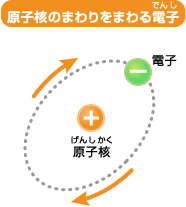
わたしたちの体、動物、空気、水など、世の中のすべてのものは「原子」でできています。
原子の構造は、真中にプラスの電気を持った「原子核」があり、そのまわりをマイナスの電気を持った「電子」が飛び回っています。
この電子が、なんらかの力を受けて移動すると「電子の流れ(電流)」が生まれて、それが電気になります。
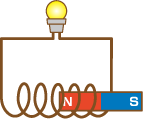
電気は、磁石とコイル(うずまき状に巻いた金属の線)を使ってつくります。コイルとコイルの間で磁石を回すと、電子の流れができて、コイルに電流が流れます。これを“電磁誘導”といいます。

自転車のライトも同じしくみです。
タイヤの回転に合わせて磁石を回すことで、
コイルに電気が流れます。
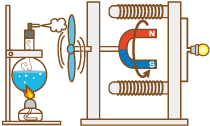
このしくみを大規模にしたのが発電所です。
発電所では、タービンという大きな回転機を使って磁石を回します。
蒸気などの力でタービンを回して電気をつくっています。
『水槽は水を湛え、泉は湧き出す』
the cistern contains : the fountain overflows.
これは18世紀の英国の詩人 William Blake による詩集「地獄の格言」の中にある詩の一節です。人生や人の世のいろいろな想いがこの一節には込められているに違いないのですが、詩心を持たぬ私は、これこそ教育の理想を述べていると勝手に解釈しています。
すなわち、「天下り的に詰め込まれた知識は、あたかも水槽に湛えられた水の如く、時の経過とともにいつかは蒸発して消え失せてしまう。それよりも、たとえ知識は乏しくとも、永遠にアイディアが湧き出す「発想の泉」を彼らの頭に掘り起こすことの方がはるかに大切である」と。
この理想を実現させるために、さくら教育研究所では、1994年より受験一辺倒の知識詰め込み型教育を改め、考える楽しさを存分に味わいながら真の学力が身につく数多くのプログラムを開発してきました。
この開発によって得られた成果を、広く全国の小中高校生、大学受験生にも伝え、勉強嫌いを減らし、考える楽しさ、思考力や創造性に富む若者を育てようという目的で日夜生徒さんと奮闘しております。










